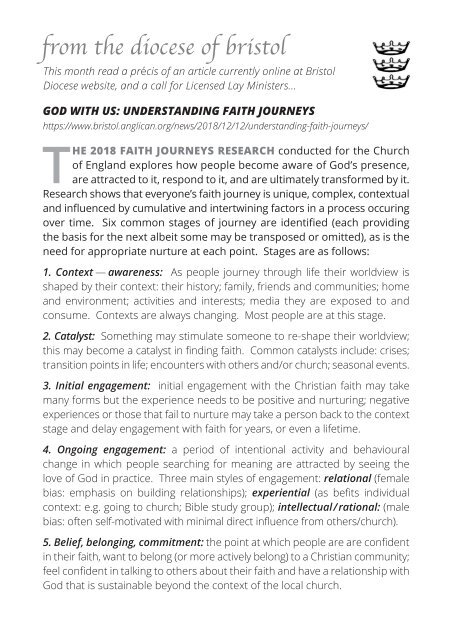Create successful ePaper yourself
Turn your PDF publications into a flip-book with our unique Google optimized e-Paper software.
from the diocese of bristol<br />
This month read a précis of an article currently online at Bristol<br />
Diocese website, and a call for Licensed Lay Ministers...<br />
GOD WITH US: UNDERSTANDING FAITH JOURNEYS<br />
https://www.bristol.anglican.org/news/2018/12/12/understanding-faith-journeys/<br />
THE 2018 FAITH JOURNEYS RESEARCH conducted for the <strong>Church</strong><br />
of England explores how people become aware of God’s presence,<br />
are attracted to it, respond to it, and are ultimately transformed by it.<br />
Research shows that everyone’s faith journey is unique, complex, contextual<br />
and influenced by cumulative and intertwining factors in a process occuring<br />
over time. Six common stages of journey are identified (each providing<br />
the basis for the next albeit some may be transposed or omitted), as is the<br />
need for appropriate nurture at each point. <strong>St</strong>ages are as follows:<br />
1. Context — awareness: As people journey through life their worldview is<br />
shaped by their context: their history; family, friends and communities; home<br />
and environment; activities and interests; media they are exposed to and<br />
consume. Contexts are always changing. Most people are at this stage.<br />
2. Catalyst: Something may stimulate someone to re-shape their worldview;<br />
this may become a catalyst in finding faith. Common catalysts include: crises;<br />
transition points in life; encounters with others and/or church; seasonal events.<br />
3. Initial engagement: initial engagement with the Christian faith may take<br />
many forms but the experience needs to be positive and nurturing; negative<br />
experiences or those that fail to nurture may take a person back to the context<br />
stage and delay engagement with faith for years, or even a lifetime.<br />
4. Ongoing engagement: a period of intentional activity and behavioural<br />
change in which people searching for meaning are attracted by seeing the<br />
love of God in practice. Three main styles of engagement: relational (female<br />
bias: emphasis on building relationships); experiential (as befits individual<br />
context: e.g. going to church; Bible study group); intellectual / rational: (male<br />
bias: often self-motivated with minimal direct influence from others/church).<br />
5. Belief, belonging, commitment: the point at which people are are confident<br />
in their faith, want to belong (or more actively belong) to a Christian community;<br />
feel confident in talking to others about their faith and have a relationship with<br />
God that is sustainable beyond the context of the local church.<br />
6. Transformation: The transformed person becomes an active follower of<br />
Jesus Christ. There is a need to nurture and release people at this stage to<br />
ensure their talents are discerned and used well in the local context and to<br />
preempt any sense of disillusionment or other negative affect.<br />
— For the full article please visit Bristol Diocese online using the link on the page opposite<br />
ARE YOU CALLED TO BE A<br />
LICENSED LAY MINISTER?<br />
LICENSED LAY MINISTRY<br />
(Reader Ministry) is nationally<br />
recognised as a highly significant<br />
ministry for the <strong>Church</strong> of England<br />
today, and is a vital part of Bristol<br />
Diocese’s strategy for ministry and<br />
mission in the 21st century. It is for<br />
this reason that we invest significant<br />
time, effort and commitment to<br />
developing this ministry, and encouraging<br />
vocations to this specific call.<br />
Licensed Lay Ministers (LLMs) are<br />
significant, valuable members of ministry<br />
teams. Some are in full time work, some<br />
retired, some in positions of leadership<br />
within industry, some full-time parents<br />
or carers. All are trained and equipped,<br />
canonically authorised and episcopally<br />
licensed, and freely give their ministry<br />
as people knowing they are called by<br />
God to this vocation.<br />
<br />
Licensed Lay Ministry is exercised<br />
in diverse ways — not necessarily<br />
restricted to the congregational life<br />
of the church community — and to<br />
kingdom-wide service and connectedness,<br />
in areas and relationships beyond<br />
intentional Christian gathering. Some<br />
of our LLMs have significant involvement<br />
in mission and outreach, schools<br />
work and witness, offering a ministry<br />
of the word and pastoral responsibility<br />
in opportunities for making connections<br />
both within and outside of the<br />
church beyond the traditional model<br />
of preaching and teaching.<br />
LLMs go through a structured training<br />
programme of theological study (usually<br />
Exploring Christianity) and a Formation<br />
year, where areas of Leadership,<br />
Pastoral Ministry and Preaching and<br />
Leading worship are developed. The<br />
local community is an important part<br />
of the formative journey, and the support<br />
of local learning groups during this<br />
stage is key to individuals growing into<br />
the ministers God is calling them to be.<br />
COULD THIS BE YOUR STORY?<br />
Am I Called to be a Licensed Lay Minister?<br />
will be held on Monday 6 June <strong>2019</strong> at<br />
7.00pm at the Diocesan Office, Hillside<br />
House — come along to find out more.<br />
Please book places using the link below:<br />
https://www.eventbrite.co.uk/e/am-icalled-to-be-a-licensed-lay-minister-registration-55269639981


















